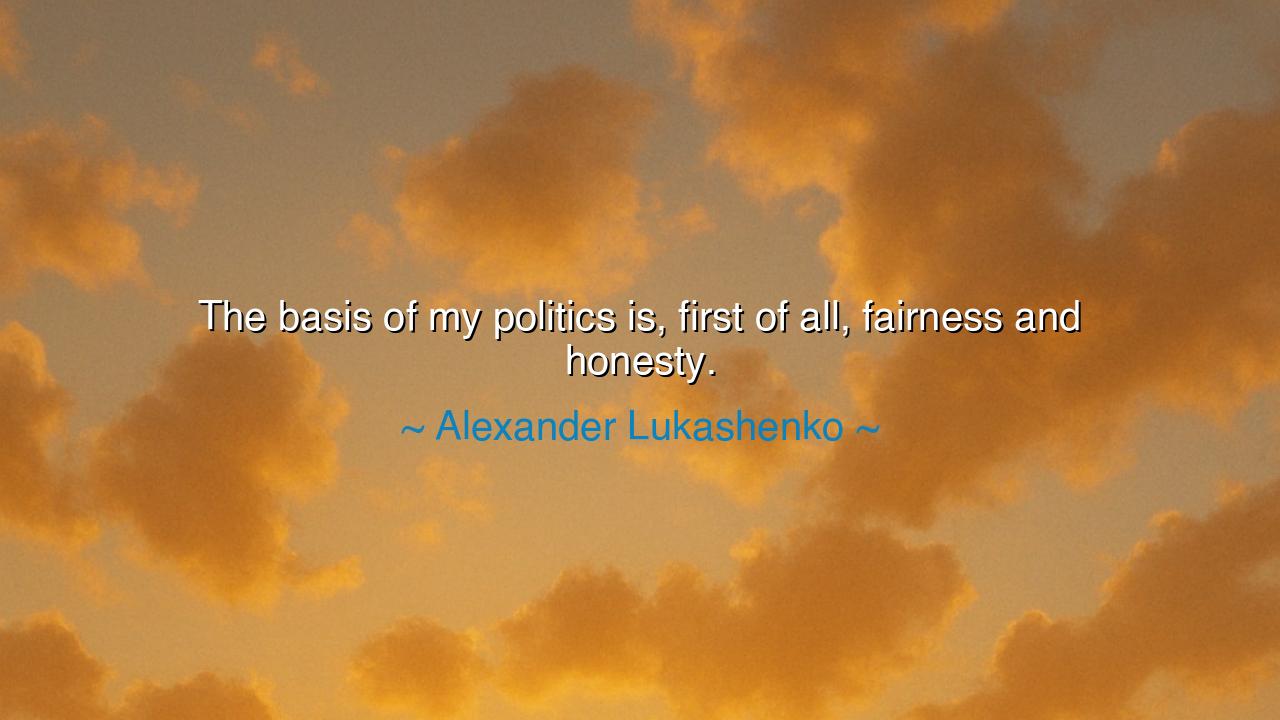
The basis of my politics is, first of all, fairness and honesty.






Hear, O children of power and principle, the words of Alexander Lukashenko: “The basis of my politics is, first of all, fairness and honesty.” In this utterance lies both an aspiration and a claim, for every ruler seeks to justify his reign with the language of virtue. He names fairness and honesty as the foundations of governance, declaring that the true measure of politics is not cunning or force, but justice and truth.
For fairness is the balance that holds society together. Without it, the strong devour the weak, and the people lose faith in their rulers. And honesty, though rare in politics, is the bond that binds leaders to their people. Lies may win power for a season, but they corrode trust, leaving behind ruin. To place fairness and honesty at the root of politics is to proclaim that authority should serve, not exploit; uplift, not oppress.
Yet history teaches us that rulers often speak of virtue while practicing another art. The claim to honesty has been the shield of many whose reigns were marked by secrecy, and the boast of fairness has often covered inequality. It is for the people and for history to judge whether the ruler’s words are truth or mask. In this tension lies the eternal struggle between political appearance and political reality.
Consider Marcus Aurelius, the philosopher-king of Rome. His reign, unlike many, truly sought fairness, guided by Stoic virtue. He held himself accountable to reason and justice, even in the turbulence of empire. His life shows that fairness and honesty can indeed be the pillars of governance when embodied sincerely. But his example also highlights how rare and difficult such integrity is in the realm of power.
Therefore, let this wisdom endure: to proclaim fairness and honesty is easy, but to live by them in politics is the work of giants. Lukashenko’s words echo an ideal that all rulers invoke, yet few embody. Let future generations take them not as a boast, but as a reminder that the legitimacy of politics rests not in strength alone, but in justice, and that no throne stands secure unless built upon truth.






HMHoa My
This quote seems to reflect an idealized vision of leadership, but does it align with the reality of Lukashenko's political career? When we hear politicians claim fairness, can we ever take it at face value, or do we need to question how they define those concepts in practice? Can any political leader truly embody these values while maintaining power through controversial means?
QH10. Ho Quoc Han
I can’t help but feel skeptical about this quote. Fairness and honesty are key principles, but how do we reconcile them with Lukashenko's long-standing reputation for clamping down on opposition and media freedom? How can a leader who controls the media and limits political competition claim to prioritize fairness?
TDHa Thanh Do
Lukashenko’s assertion about fairness and honesty feels somewhat contradictory when considering his political history. Does this mean that a government can genuinely practice fairness while also limiting freedoms and suppressing dissent? How do you define fairness in politics, especially when the balance of power is so one-sided? Is there a way to achieve fairness in an undemocratic regime?
KFKudo FF
This statement from Lukashenko raises some questions about the actual implementation of fairness and honesty in political leadership. If fairness and honesty were truly at the core of his policies, would Belarus' political environment look very different today? Can politicians genuinely practice these values in a system with so much control and limited freedom of expression?
TNTram Nguyen
It's interesting that Lukashenko claims fairness and honesty as the basis of his politics. Given the controversial nature of his leadership and the accusations of authoritarianism in his regime, is it possible to separate his political claims from the reality of his actions? How much weight should we give to these ideals when there’s a disconnect between words and actions?